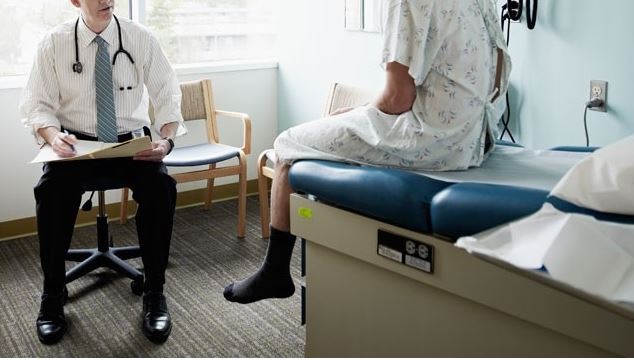Prostate Cancer Treatment
Prostate cancer is a condition that impacts nearly 20% of all men, and can occur at earlier and later stages of middle adulthood. Although the growths that form in this gland are malignant, successful treatment for this type of cancer has a highly positive prognosis, and many patients go into full remission after a comprehensive course of therapy.
However, it should be noted that part of the effectiveness of treatment is the ability to diagnose the disease at an early stage, and for this reason, regular screenings for prostate health should be engaged in, especially for men who are in their 40s or older. After the age of 50, the risk for this cancer does increase exponentially, but it can manifest in younger adult males. Generally a manual exam can return with a clean bill of health, but if abnormalities in the gland are felt, then further imaging diagnostics and a biopsy can determine whether it is prostate cancer.
Risk Factors for Prostate Cancer
Although some of the risk factors for prostate cancer are preventable, heredity and genetics do play a large part in whether a man will experience this condition. However, lifestyle factors that can be preventable risks include:
- Smoking
- Excessive alcohol consumption
- Poor nutrition, especially for hormonal support
- Obesity
- Environmental toxins from the workplace or the living space
- A history of sexually transmitted diseases
- Having a vasectomy has been linked to higher rates of prostate cancer
While genetics cannot be altered, the above risk factors all represent aspects that can be used to make informed decisions that can affect future well-being.
Symptoms of Prostate Cancer
One reason that regular screenings for prostate cancer can also be so important is because some of the symptoms for this condition can also be associated with natural changes that occur during aging. However, if any of the following issues do present, it is wise to schedule a physical for a clearer diagnosis.
- Weak flow of urine, or the inability to fully evacuate the bladder
- Consistent urge to urinate, even if unable to
- Pain during urination
- Any appearance of blood in either the urine or seminal fluids
- Sudden onset of anemia
- Pain in the lower back and sacral region
- Shortness of breath and dizziness
- Extreme fatigue which may also evidence as lack of motivation
Because of the fact that these symptoms can also apply to urinary tract infections and even kidney stones, it is always recommended that a professional diagnosis is sought. This also means that the earlier a diagnosis is returned, the greater the chances are for recovery and for a return to full quality of life.

Treating Prostate Cancer
Although prostate cancer has a good prognosis for individuals who are diagnosed with the condition, many of the treatments that are most effective are similar to other cancer interventions. This includes:
- Non-aggressive surgery – this can be used in very early stages of the illness, as it involves a local surgery that simply removes the tumor from the prostate, without amputating the entire gland.
- Aggressive surgery – in cases where the cancer has begun to take over the prostate more fully, a radical prostatectomy may be necessary. Depending on how far the cells have proliferated, the entire prostate, along with surrounding areas of tissue and lymph nodes may also need to be removed. While there are some side effects to this action, corrective prosthetics and medications can be utilized for quality of life improvement.
- Cryosurgery – this method is less invasive than traditional surgery, and involves both targeting and freezing the cancer cells to remove them from the gland.
- Radiation therapy – while this approach is similar to cryosurgery in targeting the malignant cells, it uses beams of radiation to destroy the growth, while still having the potential to salvage the health part of the prostate.
- Proton therapy – while this is another form of radiation therapy, it utilizes a different wavelength of energy to specifically target the cancer cells.
- Brachytherapy – this approach inserts radioactive seed devices into the prostate, where they are left either for a specific treatment time period or indefinitely. These capsules are designed to give off high level and low level radiation that is directed specifically at the malignant growth. The permanent placement also means that they can be highly effective in reduce the chance of relapse.
- Hormone therapy – the use of hormones for treating prostate cancer can be highly effective for certain individuals with specific physiological constitutions. Many males respond well to this approach, as too much or too little androgen or testosterone can exacerbate malignant growths. However, some people do not tolerate hormones well, so exploring this form of treatment does require professional consultations.
- Vaccine therapy – the Provenge vaccine is actually formulated with a patient’s own genetic material, in order to boost an immune response to eradicate the cancer. This approach has been highly effective in stages where the cancer is already advanced, and has shown good benefits for improving lifespan in patients.
Treating the Whole Person
As with other cancer treatment programs the use of adjunct and supportive care has also been shown to greatly improve health outcomes. For prostate cancer survivors, this can include education about risk factors and also nutritional and holistic support to improve the healing process and rebalance the body after treatment. This aspect can also be vitally necessary for addressing the importance of immune function in both treatment and recovery, especially where the vaccination method has been used.
A further aspect of adjunct care for prostate cancer survivors does include a psychological element. Some of the aggressive treatments can impact self image, sense of place and belonging in the world, and can also produce side effects that require some physical adjustments. However the use of wellness counseling and therapy throughout recovery can also balance the mental state, while using this motivation to further the balance of healing that is happening within the physical body.





